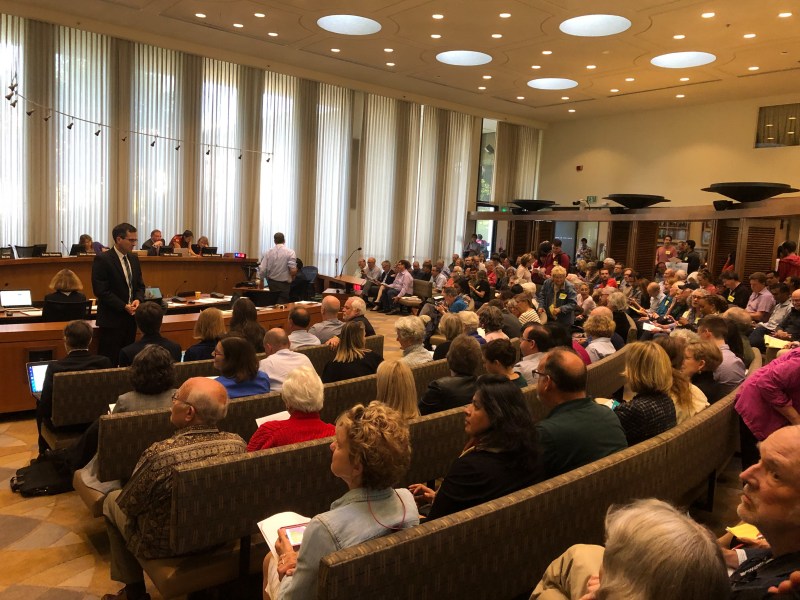Approximately 50 members of Stanford Coalition for Planning an Equitable 2035 (SCoPE 2035) and Stanford Solidarity Network (SSN), as well as public stakeholders, filed into the already packed Palo Alto City Council chambers to voice their demands at the first public hearing regarding Stanford’s new General Use Permit (GUP) application Thursday night. Completely
Santa Clara County’s Planning
The GUP, if approved, will govern Stanford’s expansion— including the number of new academic buildings and housing units that Stanford can build — through 2035. Stanford intends to build 2.275 million square feet of new academic and academic support space, 3,150 additional on-campus housing units, and 40,000 new square feet of child care facilities while also making some smaller changes.
In order for the GUP to be approved, Stanford must agree to meet certain conditions, dictated by Santa Clara County, that are meant to guide the development in a way that mitigates the impacts of the anticipated expansion and associated population growth.
The approval process has raised concerns about how Stanford’s continued development will affect affordable housing in the area, workers’ rights, graduate student welfare and the environment.
Prior to the meeting, SCoPE 2035 and SSN members held a solidarity gathering with other public stakeholders, including members of the Palo Alto Teachers’ Association, parents of the Palo Alto Unified School District, the Service Employees International Union Local 2007 (SEIU 2007) and local environmental groups, where they distributed signs and purple “housing for all” felt cloths to those present, and gave stickers advocating for full impact mitigation to members of the public.
SCoPE 2035, which was originally a branch of Students for a Sustainable Stanford (SSS), has been researching the new GUP and its impacts since Stanford first applied for the permit. In the past, SCoPE members have protested when Stanford sued the Santa Clara County Board of Supervisors for adoption of the “inclusionary housing” law, studied and released public comments on the Draft Environmental Impact Report (DEIR), which outlines the potential effects of the plans in the GUP, and released their own conditions of approval in March 2019 based on the DEIR and their organizational values. They shared these conditions of approval with the County, and have met with County supervisors to discuss their ideas.
“When it comes to [the County] sitting down and negotiating with Stanford, we trust that they’re not going to budge on the things that are important to us,” said Shelby Parks ’19, a member of SCoPE 2035.
County staff first presented on Stanford’s current Community Plan and GUP, from 2000, followed by an overview of the new GUP, DEIR, and Water Supply Assessment, which details potential impacts of the proposed development on water supply. Staff then discussed their recommendations regarding amendments to Stanford’s Community Plan and the conditions of approval related to housing, traffic, and open space.
The public commentary portion of the hearing began with a statement by Stanford representative Catherine Palter, who expressed concern over some of the County’s conditions of approval and staff’s recommendation to deny the University’s Development Agreement (DA). Her statement was followed by the words of public officials, local PTA members, and long-time residents of the Palo Alto and East Palo Alto communities.
When SSN was called to the podium, they formed a line of speakers, each using their allocated minute to tell stories as representatives of the graduate student community. Students expressed the hardships they face when it comes to affording housing, transportation, and child care on their University-given stipend, and advocated for better conditions for all workers on Stanford’s campus.
“What is the purpose of housing designated for graduate students if graduate students cannot afford to live in them?” one student asked. “How can the County count these units towards regional affordability housing quotas when these units perpetuate a crisis of affordability?”
SCoPE echoed the concerns of SSN, but also made additional suggestions regarding the conditions of approval and the DA. They encouraged the Planning Commission to improve outreach efforts to East Palo Alto, and emphasized that Stanford should be held more accountable to the Muwekma Ohlone tribe for developing on indigenous land. They also demanded “clarity and transparency” with the public in the case that DA negotiations are reopened.
“What this meeting is about is being there for some of the most impacted folks who can’t be there, because there are a lot of barriers to being involved in this process,” Parks said. “We just hope that we can create a momentum that some of the most affected folks can’t create.”
“We want an inclusive definition of the Stanford community, and that includes our workers and our neighbors,” said Erica Scott ’20, Associated Students of Stanford University (ASSU) President, who also attended the hearing in solidarity.
The planning commission will vote on their recommendations for the conditions of approval in June. Following that, the County will make their final decision on whether to approve the GUP in the fall.
Contact Kaylee Beam at kbeam97 ‘at’ stanford.edu.
